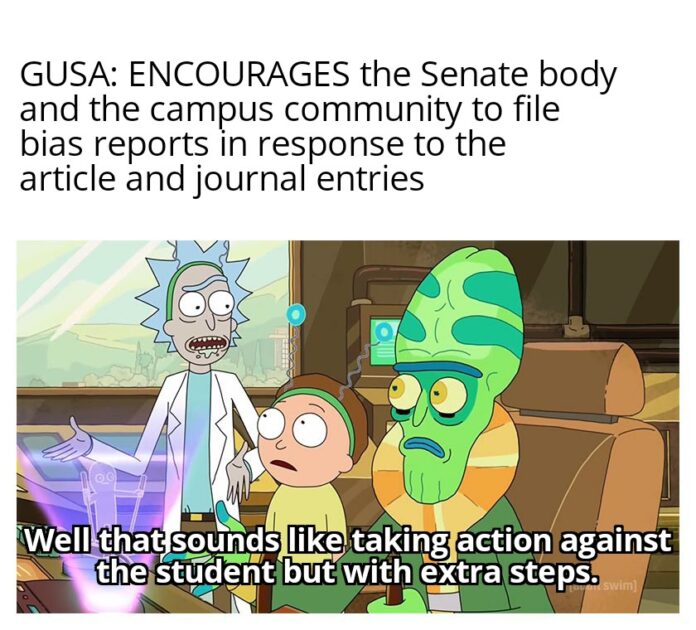![]()
A student at Georgetown recently wrote a personal blog post in which he shared his views on current events. This blog post quickly attracted negative attention from a large swath of Georgetown University students. The student was promptly harassed online by insulting, inflammatory, and even racially-charged comments made towards him and his family. The Georgetown University Student Association (GUSA) quickly introduced a resolution targeting him and his article, deciding that this matter was so pressing that it warranted breaking their own policies. The body voted to condemn his article and further “encourages the Senate body and the campus community to file bias reports in response to the article and journal entries.”
This series of events isn’t novel. It mirrors many other instances that have become commonplace in this new “cancel culture” which, unfortunately, has become an outlet for militant activists and self-righteous individuals to harass, intimidate, and punish those with whom they disagree. It is concerning that this practice, harassing individuals for having different political opinions, using institutional power to condemn said political opinions, and verbally attacking those who exercise or defend free speech rights, would become the norm at Georgetown University, an institution who describes “discourse, discussion, debate” to be “central to its being.”
The Georgetown University Free Speech and Expression Policy reads: “Ideally, discourse is open and candid and also-ideally-is characterized by courtesy, mutual reverence and even charity.” GUSA claims that the blog post violates those ideals, seemingly oblivious to the fact that calling the student’s writing “racist, ignorant, discriminatory, demeaning, and hateful” is not characteristic of courteous or even charitable discourse either. Moreover, GUSA completely ignores other aspects of the Free Speech and Expression Policy, such as “principles about putting the most favorable construction on your neighbor’s argument” and “general and equal toleration” towards “fair arguments.” One could even argue that GUSA’s targeting of the student and his writing “falsely defames a specific individual,” which is against the Free Speech and Expression Policy.
The writers of the resolution repeatedly claimed not to call for action against the student or to condemn the student personally, yet they publicly encouraged other students to take action via bias reporting. Others, like the GUSA Senate Free Speech Chair, claimed that the resolution is free speech compliant since it is “not demanding action or censorship.” The argument goes: GUSA is not demanding action against a student; they merely want to file bias reports so that action may be taken against the student (bias reporting leads to the possibility of sanctions and other administrative action). The intellectual dishonesty is astounding. What they are doing is encouraging students to target an individual with the intent to do harm, not because he has done something malicious but because they disagree with his opinions. Some may attempt to defend the resolution by saying that it does not name the student directly. In response, I ask: Against whom does GUSA intend to file bias reports? Against the article itself? What is the desired outcome from filing bias reports if not the punishment of the student?
It is no secret that the climate on campuses across the country is increasingly hostile to free speech. According to the First Amendment on Campus 2020 report, “63% of students agree that the climate on their campus deters students from expressing themselves openly.” Another report shows that 54% of students have engaged in self-censorship in class, of which 48% worried about being judged by their peers and 30% feared that their words might be considered offensive by others.
At Georgetown, the developing political climate directly threatens the ideals of free speech which the university espouses. GUSA was quick to condemn the blog post’s criticism of Black Lives Matter as racist, yet neglected to appreciate that many others, including actor Terry Crews, economist Glenn Loury, and even a former Civil Rights activist, have criticized the movement. Examining the blog post in question will reveal many talking points that echo that of mainstream thinkers like Thomas Sowell, Larry Elder, Shebly Steele, David Webb, Coleman Hughes, and others. Though one can disagree with these viewpoints, it is intellectually lazy to simply dismiss them as racist or ignorant. In the blog post, the student wrote: the “ability (or willingness) to understand an opposing view is something that I am afraid our country is losing,” and the reactions of GUSA and others at Georgetown prove his point.
Certain members of the left at Georgetown seem unable to recognize that opinions outside of their echo-chamber are acceptable and valid. Indeed, they are shocked, appalled, and feel personally injured by the fact that fellow students have differing ideological viewpoints (fairly mainstream ones at that), leading to their condemnation and harassment of others for “wrongthink.” They do not stop with the author of the blog post. Instead, they harass and dismiss those who even dared to like the post on Facebook, who want to defend free speech, or who call into question the efficacy of their tactics. As John McWhorter observed, “the new normal is, ‘If you don’t like it, cry loudly and then louder, because you’re always right and they’re just bad.’” This mentality demonstrates a stubbornness against discourse and an intolerance towards ideological diversity, ironically, from the ones who claim to champion diversity, tolerance, and respect. This is not to say that all liberals or left-leaning individuals are hypocrites, but rather to point out the close-mindedness and questionable behavior that have gone unchecked among a portion of the students at Georgetown.
The very same people who claim to fight against hatred will tolerate, even encourage, open prejudice, hatred, and harassment if it is directed at those who fall outside of their ideological orthodoxy. Surely, it is a strange time when the bullies see themselves as heroes. By “cancelling” students in the hopes of building a safer, more welcoming community, they create a more toxic, harmful, and intolerant environment than before.
To quote the blog post that sparked this controversy: “Disagreement is healthy – hatred is not.” “Cancel culture” is an existential threat to free speech and civility on campus. If left unchecked, it will only erode the values of our community. It is time for us to speak up against the tolerant hypocrites in GUSA and elsewhere at Georgetown University. Let us stand against hatred and harassment where we see it. Let us embrace debate and diversity of thought. Let us not divide ourselves but come together to better our community and the nation.
Rizana Tatlock (COL ’22) is a Contributor.
Disclaimer: The views and opinions expressed in this article are those of the author(s) and do not necessarily reflect the official or personal position of the Editorial Board, Contributors, or Business Staff of The Georgetown Review.












